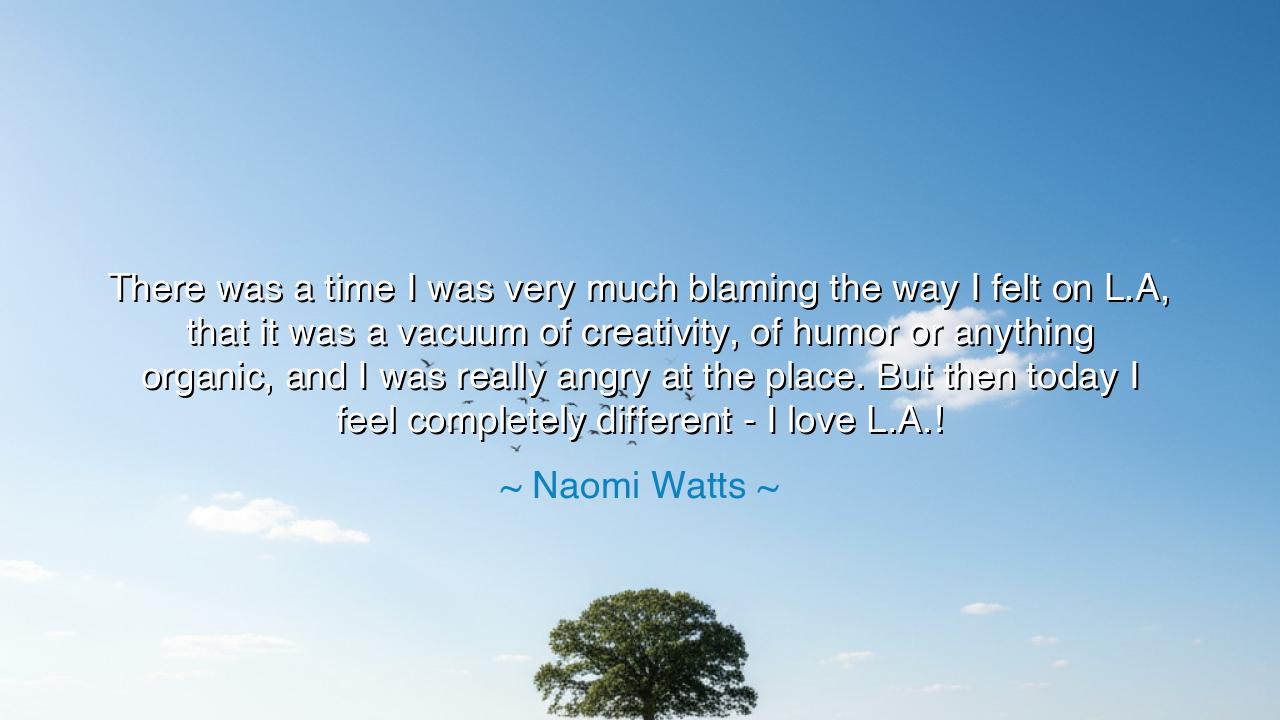
There was a time I was very much blaming the way I felt on L.A
There was a time I was very much blaming the way I felt on L.A, that it was a vacuum of creativity, of humor or anything organic, and I was really angry at the place. But then today I feel completely different - I love L.A.!






Listen closely, O Children of the Earth, for I bring you the words of Naomi Watts, who, in speaking of her journey with Los Angeles, offers us a lesson in growth and perspective: "There was a time I was very much blaming the way I felt on L.A., that it was a vacuum of creativity, of humor or anything organic, and I was really angry at the place. But then today I feel completely different - I love L.A.!" In these words, Watts speaks not just of a city, but of the profound shift in perception that takes place within the soul of every traveler, every seeker, and every human being. For in her journey, she reveals the deeper truth that places and circumstances are not inherently good or bad—they are mirrors of our own hearts, shaped and changed by how we choose to see them.
At first, L.A. appeared to her as a vacuum, a place that drained the life and creativity from her, leaving only emptiness in its wake. She felt the alienation that so many before her had felt in a city known for its glittering surface and superficial allure. Like the great philosophers of old who spoke of the power of perception, Watts was trapped in a moment where the world seemed devoid of meaning, creativity, and even humor. She had allowed the city to shape her understanding, to color her experience with a filter of frustration and anger. But, as the great teachers have always known, the way we see the world is not a fixed truth; it is something that can shift and transform.
Consider, O Children, the wisdom of Heraclitus, the ancient philosopher who taught that "you cannot step into the same river twice." Heraclitus believed that life was in constant flow, and so too was the way we experience the world. Just as Heraclitus understood the river of life to be ever-changing, so too must we recognize that the city of L.A., like the world around us, is constantly evolving. Naomi Watts’ words mirror this timeless teaching—what once seemed like a vacuum of creativity and organic connection could, with a change in perception, become a place of love and growth. Her transformation reveals the deep truth that places and situations do not define us; it is how we choose to approach them that shapes our reality.
In the same way, we can look to the example of the Buddha, who, after years of seeking enlightenment in the pleasure and suffering of the world, came to understand that true wisdom lies not in rejecting the world, but in embracing it with an open heart. Just as Buddha learned to see beyond the surface of life’s difficulties and frustrations, so too did Naomi Watts come to see beyond the surface of L.A.. She moved from anger to acceptance, from frustration to love, and in doing so, transformed her relationship with the very city she had once blamed for her unhappiness. Buddha knew that when we change our internal state, the external world reflects that change.
The example of Shakespeare’s characters, too, teaches us this important lesson. In his great comedies and tragedies, characters like King Lear or Hamlet experience moments of deep despair, yet through their journey, their perspective often shifts, revealing a deeper truth about the world. Shakespeare knew that humans are not bound by their initial perceptions of their circumstances; through reflection and growth, we can transcend our difficulties and see the beauty that lies beneath. Just as Naomi Watts transformed her anger into love, so too did Shakespeare’s characters transform their suffering into understanding, revealing that the world we live in is only as constricting as the limits we place upon it.
The lesson, O Children, is one of perspective and growth. We are often quick to blame our surroundings, to label a place or a situation as the source of our discomfort. But just as Naomi Watts discovered in her own journey, it is not the world that changes, but our ability to see it clearly and with an open heart. L.A., once a vacuum of frustration and emptiness, became, for Watts, a place of love because she chose to look at it with new eyes. In every moment of difficulty, in every challenge, there is the potential for transformation—but this transformation begins within us. How we perceive the world is how we live in it.
Therefore, O Children, let us learn to embrace the world around us, even when it seems difficult or foreign. Do not be quick to judge your circumstances, for they are but reflections of your own heart. When you find yourself in frustration or confusion, look inward and ask how you might change your own perception to transform the world around you. Like Naomi Watts, you may find that the very place you once saw as an enemy is, in fact, a companion on your journey of growth. Love for the world begins with love for yourself, and it is through this love that you will see even the most challenging of circumstances reveal their deeper beauty.






AAdministratorAdministrator
Welcome, honored guests. Please leave a comment, we will respond soon